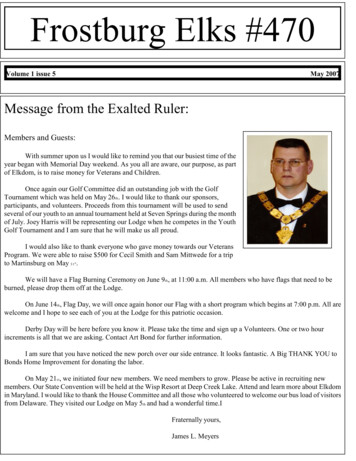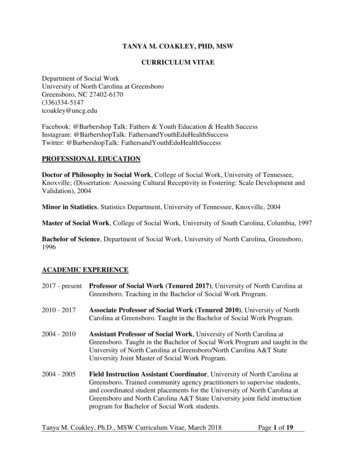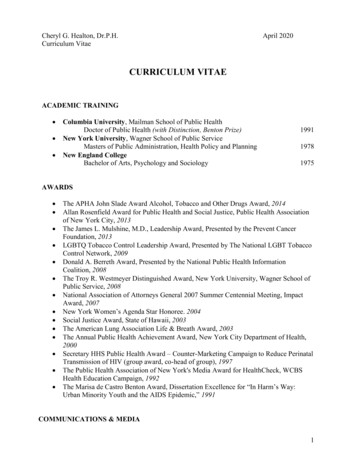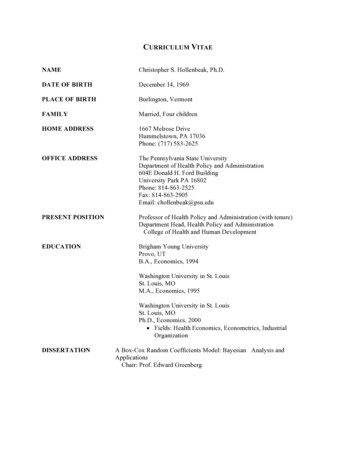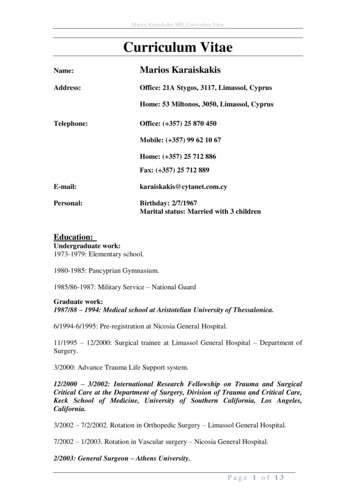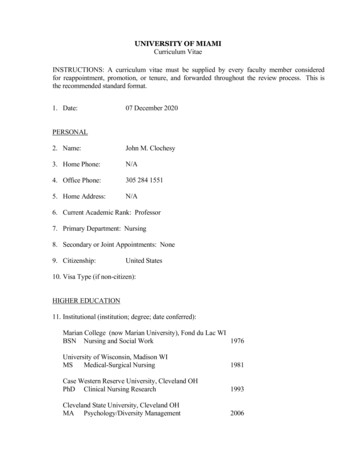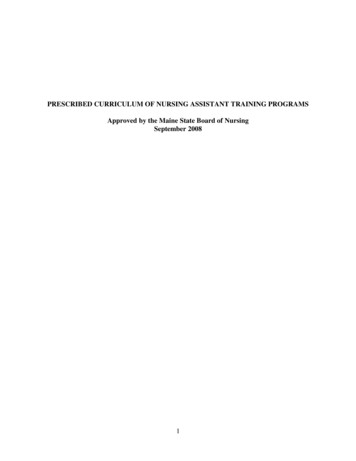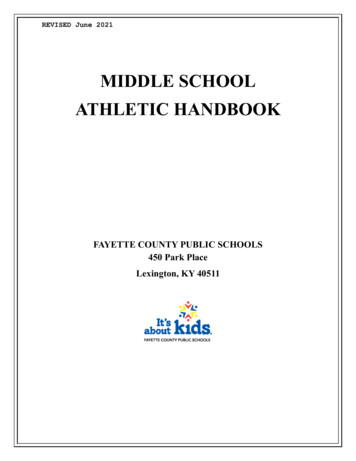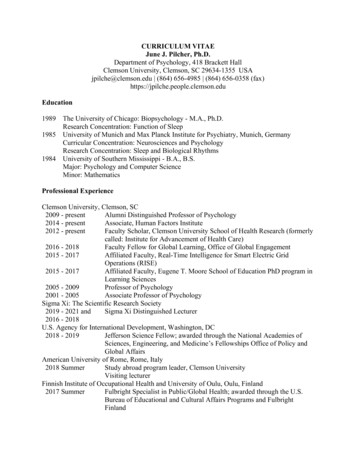
Transcription
CURRICULUM VITAEJune J. Pilcher, Ph.D.Department of Psychology, 418 Brackett HallClemson University, Clemson, SC 29634-1355 USAjpilche@clemson.edu (864) 656-4985 (864) 656-0358 89The University of Chicago: Biopsychology - M.A., Ph.D.Research Concentration: Function of Sleep1985 University of Munich and Max Planck Institute for Psychiatry, Munich, GermanyCurricular Concentration: Neurosciences and PsychologyResearch Concentration: Sleep and Biological Rhythms1984 University of Southern Mississippi - B.A., B.S.Major: Psychology and Computer ScienceMinor: MathematicsProfessional ExperienceClemson University, Clemson, SC2009 - presentAlumni Distinguished Professor of Psychology2014 - presentAssociate, Human Factors Institute2012 - presentFaculty Scholar, Clemson University School of Health Research (formerlycalled: Institute for Advancement of Health Care)2016 - 2018Faculty Fellow for Global Learning, Office of Global Engagement2015 - 2017Affiliated Faculty, Real-Time Intelligence for Smart Electric GridOperations (RISE)2015 - 2017Affiliated Faculty, Eugene T. Moore School of Education PhD program inLearning Sciences2005 - 2009Professor of Psychology2001 - 2005Associate Professor of PsychologySigma Xi: The Scientific Research Society2019 - 2021 andSigma Xi Distinguished Lecturer2016 - 2018U.S. Agency for International Development, Washington, DC2018 - 2019Jefferson Science Fellow; awarded through the National Academies ofSciences, Engineering, and Medicine’s Fellowships Office of Policy andGlobal AffairsAmerican University of Rome, Rome, Italy2018 SummerStudy abroad program leader, Clemson UniversityVisiting lecturerFinnish Institute of Occupational Health and University of Oulu, Oulu, Finland2017 SummerFulbright Specialist in Public/Global Health; awarded through the U.S.Bureau of Educational and Cultural Affairs Programs and FulbrightFinland
Pilcher, pg. 2Webster University, Vienna, Austria2014 SummerVisiting lecturerUniversity of Vienna, Social, Cognitive, & Affective Neuroscience Unit and The Sigmund FreudMuseum, Vienna, Austria2011 - 2012Fulbright-Freud Visiting Scholar; awarded through the Fulbright Programfor U.S. Scholars and Fulbright AustriaUniversity of Maryland, Center for Advanced Study of Language, Silver Spring, MD2003 - 2010Adjunct Professor; SME on fatigue and stressU.S. Department of Transportation, Federal Railroad Administration, Washington, DC1997 - 2004Consultant, Volpe National Transportation Systems Center1998 - 2003North American Rail Alertness Partnership, SME on fatigue and stressBradley University, Peoria, IL1998 - 2001Associate Professor of Psychology1992 - 1998Assistant Professor of PsychologyWalter Reed Army Institute of Research (WRAIR), Division of Medical Neurosciences,Washington, DC1989 - 1992Research psychologistMax Planck Institute, Munich, Germany1989 SummerVisiting research psychologistThe University of Chicago, Chicago, IL1985 - 1989Graduate researcher, teaching assistantLoyola University of Chicago, Chicago, IL1988 - 1989Visiting lecturerMax Planck Institute and the University of Munich, Munich, Germany1984 - 1985German Academic Exchange Service (DAAD) Fellow; awarded throughthe Fulbright Program for U.S. StudentsActive Military Service1989 - 1992 Commissioned officer in U.S. Army, Captain, Research psychologistPermanent duty station: Division of Medical Neurosciences, Walter Reed ArmyInstitute of Research, Washington, D.C.1978 - 1982 Enlisted in U.S. Navy, Petty Officer 2nd Class, Hospital corpsmanPermanent duty stations: Naval hospitals, Memphis, TN. and Okinawa, JapanProfessional Awards and HonorsFulbright Specialist Roster Candidate, U.S. Department of State’s Bureau of Educational andCultural Affairs and the Institute of International Education’s Council for InternationalExchange of Scholars (2015 - 2020)University Research, Scholarship and Artistic Achievement Award, Clemson University (2018,inaugural cohort) lCreative Inquiry Mentor Incentive Award, Creative Inquiry and Undergraduate Research,Clemson University (2016)Dean’s Award for Interdisciplinary Collaboration Teaching/Service, College of Business and
Pilcher, pg. 3Behavioral Science, Clemson University (2016)Researcher of the Month, Clemson University Libraries, Clemson University (2016, February)The Class of ’39 Award for Excellence, Clemson University y-senate/excellence.htmlInaugural Researcher of the Month, Clemson University Libraries, Clemson University (2014,January)Recognized in “The Difference Makers Project,” Clemson housing, Division of Student Affairs,Clemson University (2011, 2012, 2013)Board of Trustees Award for Faculty Excellence, Clemson University (2011, 2012)Outstanding Researcher of the Year Award, Sigma Xi Chapter, Clemson University (2011)Fellow, Association for Psychological Science (2010)Master Faculty Address, New Student Convocation, Clemson University (2010)Phil and Mary Bradley Award for Mentoring in Creative Inquiry, Clemson University (2010)Douglas W. Bradbury Award, Honors College, Clemson University (2009)Senior Scholar Research Excellence Award, College of Business and Behavioral Science,Clemson University (2006)Best Presentation - Mentor Award, Student Research/Creative Achievement Exhibition, BradleyUniversity (2000, 2001)Bradley University Research Mentor Award (1997)Who's Who among America's Teachers (nominated by Bradley University student, 1996)Sigma Xi, The Scientific Research Society (1994)Century Fellowship, The University of Chicago (1985 - 1989)Phi Kappa Phi, National Honor Society (1984)Thomas Freeney Award for Excellence in Psychology, University of Southern Mississippi(1984)Psi Chi, National Honor Society in Psychology (1983)Kappa Mu Epsilon, Mathematics Honor Society (1983)Peer-Reviewed Publications (*student collaborators)Pilcher, J. J., *Erikson, D. N., & *Yochum, C. A. (2020). Fighting the freshman fifteen:Sleep, exercise, and BMI in college students. American Journal of Health Promotion. doi:10.1177/0890117120969065Pilcher, J. J., *Morris, D. M., *Limyansky, S. E., & *Bryant, S. A. (2020). The effect ofusing activity workstations on heart rate variability during complex cognitive tasks. Journal ofAmerican College Health. doi: 10.1080/07448481.2020.1782919Pilcher, J. J. & *Morris, D. M. (2020). Sleep and organizational behavior: Implicationsfor workplace productivity and safety. Frontiers in Psychology, 11, 45. doi:10.3389/fpsyg.2020.00045*Jordan, K. A., Gagnon, R. J., Anderson, D. M., & Pilcher, J. J. (2018). Enhancing thecollege student experience: Outcomes of a leisure education program. Journal of ExperientialEducation, 41(1), 90-106. doi: 10.1177/1053825917751508Pilcher, J. J., Switzer, F. S. III, *Munc, A., *Donnelly, J, *Jellen, J. C., & Lamm, C.(2018). Psychometric properties of the Epworth Sleepiness Scale: A factor analysis and item-
Pilcher, pg. 4response theory approach. Chronobiology International, 35(4), 533-545. doi:10.1080/07420528.2017.1420075*Morris, D. M., Pilcher, J. J., *Mulvihill, J. B., & *Vander Wood, M. A. (2017).Performance awareness: Predicting cognitive performance during simulated shiftwork usingchronobiological measures. Applied Ergonomics, 63, 9-16. doi: 10.1016/j.apergo.2017.03.009*Morris, D. M., Pilcher, J. J., & Powell, R. B. (2017). Task dependent cold stress duringexpeditions in Antarctic environments. International Journal of Circumpolar Health, 76(1),1379306. doi: 10.1080/22423982.2017.1379306Pilcher, J. J., *Morris, D. M., *Bryant, S. A., Merritt, P. A., & *Feigl, H. B. (2017).Decreasing sedentary behavior: Effects on academic performance, meta-cognition, and sleep.Frontiers in Neuroscience, 11, 219. doi: 10.3389/fnins.2017.00219*Morris, D. M. & Pilcher, J. J. (2016). The cold driver: Cold stress while driving resultsin dangerous behavior. Biological Psychology, 120, 149-155. doi:10.1016/j.biopsycho.2016.09.011Pilcher, J. J. & *Bryant, S. A. (2016). Implications of social support as a self-controlresource. Frontiers in Behavioral Neuroscience, 10, 228. doi: 10.3389/fnbeh.2016.00228Pilcher, J. J., *Jennings, K. S., *Phillips, G., & McCubbin, J. A. (2016). Auditoryattention and comprehension during a simulated night shift: Effects of task characteristics.Human Factors, 58(7), 1031-1043. doi: 10.1177/0018720816654377Pilcher, J. J. & *Baker, V. C. (2016). Task performance and meta-cognitive outcomeswhen using activity workstations and traditional desks. Frontiers in Psychology, 7, 957. doi:10.3389/fpsyg.2016.00957*Morris, D. M., Pilcher, J. J., & Switzer III, F. S. (2015). Lane heading difference: Aninnovative model for drowsy driving detection using retrospective analysis around curves.Accident Analysis & Prevention, 80, 117-124. doi: 10.1016/j.aap.2015.04.007Pilcher, J. J., *Callan, C., & *Posey, J. L. (2015). Sleep deprivation affects reactivity topositive but not negative stimuli. Journal of Psychosomatic Research, 79(6), 657-662. doi:10.1016/j.jpsychores.2015.05.003Pilcher, J. J., *Morris, D. M., *Donnelly, J., & *Feigl, H. B. (2015). Interactionsbetween sleep habits and self-control. Frontiers in Human Neuroscience, 9, 284. doi:10.3389/fnhum.2015.00284*McClelland, L. E., Switzer, F. S., III, & Pilcher, J. J. (2013). Changes in decisionmaking in nurses across a 12-hour day shift. Occupational Medicine, 63(1), 60-65. doi:10.1093/occmed/kqs189Pilcher, J. J., *Geldhauser, H. A., *Beeco, J. A., & Lindquist, T. A. (2013). Controlledattention and sleep deprivation: Adding a self-regulation approach? International Journal ofPsychological Studies, 5(1), 71-83. doi: 10.5539/ijps.v5n3p71McCubbin, J. A., *Peach, H., Moore, D. D., & Pilcher, J. J. (2012). Decreasedcognitive/CNS function in young adults at risk for hypertension: Effects of sleep deprivation.International Journal of Hypertension. doi: 10.1155/2012/989345. (special edition: IJHPerspectives on Behavioral Medicine)Pilcher, J. J., *Vander Wood, M. A., & *O’Connell, K. L. (2011). The effects ofextended work under sleep deprivation conditions on team-based performance. Ergonomics,54(7), 587-596.
Pilcher, pg. 5*McClelland, L. E., Pilcher, J. J., & Moore, D. D. (2010). Oculomotor measures aspredictors of performance under sleep deprivation conditions. Aviation, Space andEnvironmental Medicine, 81(9), 833-842.McCubbin, J. A., Pilcher, J. J., & Moore, D. D. (2010). Blood pressure increases duringa simulated night shift in persons at risk for hypertension. International Journal of BehavioralMedicine, 17, 314-320.*Odle-Dusseau, H. N., *Bradley, J. L., & Pilcher, J. J. (2010). Subjective perceptions ofthe effects of sustained performance under sleep-deprivation conditions. ChronobiologyInternational, 27(2), 318-333.Battisto, D. B., Pak, R., *Vander Wood, M. A., & Pilcher, J. J. (2009). Using a taskanalysis to describe nursing work in acute care patient environments. Journal of NursingAdministration, 39(12), 537-547.*Walker, A. D., Muth, E. R., *Odle-Dusseau, H. N., Moore, D. & Pilcher, J. J. (2009).The effects of 28 hours of sleep deprivation on respiratory sinus arrhythmia during tasks withlow and high controlled attention demands. Psychophysiology, 46, 217-224.*McClelland, L. E. & Pilcher, J. J. (2007). Assessing subjective sleepiness during anight of sleep deprivation: Examining the internal state and behavioral dimensions of sleepiness.Behavioral Medicine, 33(1), 17-26.Pilcher, J. J., *Band, D., *Odle-Dusseau, H. N., & Muth, E. R. (2007). Humanperformance under sustained operations and sleep deprivation conditions: Toward a model ofcontrolled attention. Aviation, Space and Environment Medicine, 78(5, Suppl.), B15-24.Pilcher, J. J., *McClelland, L. E., Moore, D. D., Haarmann, H., *Baron, J., Wallsten, T.S., & McCubbin, J. A. (2007). Language performance under sustained work and sleepdeprivation conditions. Aviation, Space and Environmental Medicine, 78(5, Suppl.), B25-38.McCubbin, J. A., Pilcher, J. J., Britt, T. W., & Wallsten, T. (2006). Stress and fatigue inforeign language professionals: Implications for global security. Forum on Public Policy 6/mccubbin.pdf).Pilcher, J. J., Popkin, S. M., *Adkins, K., & *Roether, L. (2005). Self-report naps inirregular work schedules. Industrial Health, 43(1), 123-128.Pilcher, J. J., *Teichman, H. M., Popkin, S. M., *Hildebrand, K. R., & Coplen, M. K.(2004). Effect of day length on sleep habits and subjective on-duty alertness in irregular workschedules. Transportation Research Record, 1865, 72-79.Schmitt, D. P., & Pilcher, J. J. (2004). Evaluating evidence of psychological adaptation:A construct validity approach. Psychological Science, 15(10), 643-649.Pilcher, J. J., Pury, C. L. S., & Muth, E. R. (2003). Assessing subjective daytimesleepiness: An internal state versus behavior approach. Behavioral Medicine, 29(2), 60-67.Pilcher, J. J., *Anderson, J., *Edwards, G., & Coplen, M. K. (2002) Work- and sleeprelated predictors of subjective on-duty alertness in irregular work schedules. TransportationResearch Record, 1803, 16-21.Pilcher, J. J., Nadler, E., & Busch, C. (2002). Effects of hot and cold temperatureexposure on performance: A meta-analytic review. Ergonomics, 45(10), 682-698.Masi, A. T., White, K. P., & Pilcher, J. J. (2002). Biopsychosocial perspectives offibromyalgia syndrome in populations: Support for person-centered models of care, teaching,and research. Seminars in Arthritis and Rheumatism, 32(2), 71-93.
Pilcher, pg. 6Pilcher, J. J., *Michalowski, K. R., & *Carrigan, R. D. (2001). The prevalence of daytime napping and its effect on night sleep. Behavioral Medicine, 27(2), 71-76.Pilcher, J. J., & Coplen, M. K. (2000). Work/rest cycles in railroad operations: Effects ofshorter-than 24-hour shift work schedules and on-call schedules on sleep. Ergonomics, 43(5),573-588.Pilcher, J. J., *Lambert, B. J., & Huffcutt, A. I. (2000). Differential effects of permanentand rotating shifts on self-report sleep length: A meta-analytic review. Sleep, 23(2), 155-163.Pilcher, J. J., *Schoeling, S. E., & *Prosansky, C. M. (2000). Self-report sleep habits aspredictors of subjective sleepiness. Behavioral Medicine, 25, 161-168.Pilcher, J. J., & Sessions, G. R. (1999). Differential effects of zolpidem, triazolam anddiazepam on performance in a radial maze task. Psychobiology, 27(4), 491-499.Pilcher, J. J. (1998). Affective and daily event predictors of life satisfaction in collegestudents. Social Indicators Research, 43(3), 291-306.Pilcher, J. J., & *Ott, E. S. (1998). The relationships between sleep and measures ofhealth and well-being in college students: A repeated measures approach. Behavioral Medicine,23(4), 170-178.Sessions, G. R., Pilcher, J. J., & Elsmore, T. F. (1998). Scopolamine-inducedimpairment in concurrent fixed-interval responding in a radial maze task. Pharmacology,Biochemistry and Behavior, 59(3), 641-647.Pilcher, J. J., *Ginter, D. R., & *Sadowsky, B. (1997). Sleep quality versus sleepquantity: Relationships between sleep and measures of health, well-being, and sleepiness incollege students. Journal of Psychosomatic Research, 42(6), 583-596.Pilcher, J. J., Sessions, G. R., & *McBride, S. A. (1997). Scopolamine impairs spatialworking memory in the radial maze: An analysis by error type and choice. Pharmacology,Biochemistry and Behavior, 58(2), 449-459.Pilcher, J. J., & *Walters, A. S. (1997). How sleep deprivation affects psychologicalvariables related to college students’ cognitive performance. Journal of American CollegeHealth, 46(3), 121-126.Pilcher, J. J., & Huffcutt, A. I. (1996). Effects of sleep deprivation on performance: Ameta-analysis. Sleep, 19(4), 318-326.Pilcher, J. J., Bergmann, B. M., Refetoff, S., Fang, V. S., & Rechtschaffen, A. (1991).Sleep deprivation in the rat: XIII. The effect of hypothyroidism on sleep deprivation symptoms.Sleep, 14(3), 201-210.Pilcher, J. J., Bergmann, B. M., Fang, V. S., Refetoff, S., & Rechtschaffen, A. (1990).Sleep deprivation in the rat: XI. The effect of guanethidine-induced sympathetic blockade on thesleep deprivation syndrome. Sleep, 13(3), 218-231.Everson, C. A., Gilliland, M. A., Kushida, C. A., Pilcher, J. J., Fang, V. S., Refetoff, S.,Bergmann, B. M., & Rechtschaffen, A. (1989). Sleep deprivation in the rat: IX. Recovery. Sleep,12, 60-67.Pilcher, J. J., & Schulz, H. (1987). The interaction between EEG and transient muscleactivity during sleep in humans. Human Neurobiology, 6, 45-49.Haustein, W., Pilcher, J., Klink, J., & Schulz, H. (1986). Automatic analysis overcomeslimitations of sleep stage scoring. Electroencephalography and Clinical Neurophysiology, 64,364-374.
Pilcher, pg. 7Peer-Reviewed Book Chapters (*student collaborators)Pilcher, J. J. & *Morris, D. M. (2016). Sleep habits and self-control: Possibleinteractions between sleep and daily decision making. In C. Saunders (Ed.), Psychology of selfcontrol: New research (pp. 1-14). Hauppauge, NY: Nova Science Publishers, Inc.Pilcher, J. J. (2013). Sleep and athletes. In C. A. Kushida (Ed.), Encyclopedia of sleep(Vol. 2) (pp. 711-713). Waltham, MA: Academic Press.Pilcher, J. J. (2013). Sleep and shiftwork. In C. A. Kushida (Ed.), Encyclopedia of sleep(Vol 2) (pp. 714-717). Waltham, MA: Academic Press.Pilcher, J. J., *Burnett, M. L., & McCubbin, J. A. (2012). Measurement of sleep andsleepiness. In M. Wang, R. R. Sinclair, & L. Tetrick (Eds.), Research methods in occupationalhealth psychology: Measurement, design, and data analysis (pp. 49-60). New York: RoutledgeTaylor & Francis Group.Pilcher, J. J. (2005). The effects of shift work on sleep. In C. Kushida (Ed.), Sleepdeprivation: Basic science, physiology, and behavior (pp. 157-166). New York, NY: MarcelDekker.Pilcher, J. J., & *Odle-Dusseau, H. N. (2005). Impact on self-reported sleepiness,performance, effort, and motivation. In C. Kushida (Ed.), Sleep deprivation: Clinical issues,pharmacology, and sleep loss effects (pp. 251-260). New York, NY: Marcel Dekker.Bergmann, B., Everson, C., Gilliland, M., Kushida, C., Obermeyer, W., Pilcher, J.,Prete, F. & Rechtschaffen, A. (1989). Sleep deprivation and thermoregulation. In: J. Horne (Ed.),Sleep '88 (pp. 91-95). New York: Gustav Fischer Verlag.Manuscripts under Review (*student collaborators)*Morris, D. M., Kassner, M. P., & Pilcher, J. J. (under review). Thermal stress limitsself-control self-efficacy in those with high and low trait-self-control but does not impact selfcontrol performance.Pilcher, J. J. & *Morris, D. M. (under review). A practical review of self-controlmeasurement methodologies.Other PublicationsPilcher, J. J. (2016). Invited Commentary: Angiogenesis, aging, and Alzheimer’sdisease. American Scientist, 104(2), 85.Pilcher, J. J. (2015). Sleep: The pattern of life. Phi Kappa Phi Forum, 95(4), 14-16.Pilcher, J. J. (2013). The human brain: All systems go! Phi Kappa Phi Forum, 93(1), 89.Pilcher, J. J. (2013). I remember: Memories of an academic neophyte. Clemson WorldMagazine 67(1), 10-11.Pilcher, J. J. (2012, September 19). Clemson to Vienna, the journey of a Fulbright-Freudscholar and martial arts enthusiast. Clemson Discovery Blog. EurekAlert!https://www.eurekalert.org/pub releases/2012-09/cu-cp091912.php
Pilcher, pg. 8Peer-Reviewed Abstract and Proceedings Publications – Conference Presentations (total:62; citations for last 5 years below, complete list available on request; *student collaborators)Pilcher, J. J., Bisson, J. B., & *Scircle, E. J. (2020). The impact of short-term brightgreen light exposure in partially sleep-deprived persons [Abstract]. Sleep, 43 (Suppl.), A67-A68.*Morris, D. M., & Pilcher, J. J. (2019). Never mind, it’s too cold: Thermal stress and adecrease in self-control self-efficacy. In Proceedings of the Human Factors and ErgonomicsSociety 63rd Annual Meeting, 63, 1018-1022.*Morris, D. M., Pilcher, J. J., Allard-Keese, C. M., & Speziale, B. J. (2018). CreativeInquiry: A platform for match-making in research. In R. L. Miller & A. Martinez (Eds.)Teaching Tips: A Compendium of Conference Presentations on Teaching, 2016-17, ebooks/teachingtips2.pdf*Morris, D. M., *Erno, J. M., & Pilcher, J. J. (2017). Electrodermal response andautomation trust during simulated self-driving car use. In Proceedings of the Human Factors andErgonomics Society 61st Annual Meeting, 61, 1759-1762.*Morris, D. M., & Pilcher, J. J. (2017). The use of portable physiological equipment inpsychological teaching. In R. L. Miller & T. Collette (Eds.) Teaching Tips: A Compendium ofConference Presentations on Teaching, 2015-16, Morris, D. M., Powell, R. B., & Pilcher, J. J. (2016). Antarctica: Cold stress risksduring occupational and leisure activities. Proceedings of the Human Factors and ErgonomicsSociety 60th Annual Meeting, 60, 1775-1779.Other Peer-Reviewed Conference Presentations (total: 67; citations for last 5 years below,complete list available on request; *student collaborators)*Kent, H., *Klaasmeyer, M., *Wilkison, V., *Schmidt, L., *Mack, N., Bisson, J.,Sanborn, S., & Pilcher, J. J. (2020, April). Using Bouncy Bands within a Classroom toMaintain Attention. Abstract accepted for poster presentation at the annual meeting of theSoutheastern Psychological Association, New Orleans, LA. In-person conference cancelled(COVID-19).*Erikson, D. N., *Yochum, C. A., & Pilcher, J. J. (2019, May). Fighting the freshmanfifteen: The impact of sleep and exercise on BMI among college students. Poster presentation atthe 31st Annual Association of Psychological Science Convention, Washington, DC.*Scircle, E. J., Bisson, J. B., *Morris, D. M., & Pilcher, J. J. (2019, May). Let there belight: Immediate effects of bright light exposure on partially sleep-deprived college students.Poster presentation at the 31st Annual Association of Psychological Science Convention,Washington, DC.Bisson, J. B., Sanborn, S. M., *Dame, A. & Pilcher, J. J. (2019, March). The effect ofbouncy bands on classroom behavior. Poster presentation at the Society for Research in ChildDevelopment Biennial Meeting, Baltimore, MD.Nagy, S., Pilcher, J. J., & Amerson, R. (2018, October) Becoming a strategic priority inword and deed. Presentation at Association of American Colleges & Universities GlobalEngagement and Spaces of Practice Conference, Seattle, WA.
Pilcher, pg. 9*Roberts, A. S., Pilcher, J. J., & Rosopa, P. J. (2018, April). The influence of bodytemperature and mental state on cognitive performance under sleep deprivation. Posterpresentation at the Southeastern Human Factors Applied Research Conference, Clemson, SC.*Hulett, T. L., *Harrill, P. S., *Diaz, E., *Spencer, J. H., *Soman, A. K., *Morris, D. M.,& Pilcher, J. J. (2018, March). Move to improve: FitDesks make reading more enjoyablewithout impairing comprehension. Poster presentation at the 64th Annual Meeting of theSoutheastern Psychological Association, Charleston, SC.*Old, A. E., *Benfield, E. J., *Harley, L. A., *McGill, S. L., Bisson, S. L., Sanborn, S.M., & Pilcher, J. J. (2018, March). Exercising attention: The effect of bouncy bands onclassroom behaviors. Poster presentation at the 64th Annual Meeting of the SoutheasternPsychological Association, Charleston, SC.Pilcher, J. J., Rintamäki, H., & *Morris, D. M. (2017, June). Impact of circadianrhythms and cold stress on health. Invited presentation at the International Congress of ArcticSocial Sciences (ICASS) IX, Umeå, Sweden.*Morris, D. M., & Pilcher, J. J. (2017, May). Resist: A methodological toolkit formeasuring self-control. Poster presentation at the 29th Annual Association of PsychologicalScience Convention, Boston, MA.Pilcher, J. J., *Morris, D. M., *Hulett, T. L., & *Macpherson, V. K. (2017, May). Homesweet home: Study habits predict perception of activity workstations. Poster presentation at the29th Annual Association of Psychological Science Convention, Boston, MA.Bisson, J. B., Sanborn, S. M., Fleming, D. S., & Pilcher, J. J. (2017, April). Wigglewhile you work: The effect of bouncy band use on classroom outcomes. Poster presentation at theSociety for Research in Child Development Biennial Meeting, Austin, TX.*Cashman, J. M., *Limyansky, S. E., *Macpherson, V. K., & Pilcher, J. J. (2017,March). Effects of low-intensity activity on academic performance and mental health. Posterpresentation at the 63rd Annual Meeting of the Southeastern Psychological Association, Atlanta,GA.*Morris, D. M., *Diaz, E., *Wilkes, M. J., & Pilcher, J. J. (2017, March). Beware ofdog: Sleep deprivation and night driving. Presentation at the 63rd Annual Meeting of theSoutheastern Psychological Association, Atlanta, GA.*Morris, D. M., *Hamilton, G. L., *Howard, E. E., & Pilcher, J. J. (2017, March).Reading your opponent: Health risk interactions in collegiate athletes. Poster presentation at the63rd Annual Meeting of the Southeastern Psychological Association, Atlanta, GA.*Morris, D. M., Pilcher, J. J., Allard-Keese, C. M., & Speziale, B. J. (2017, March).Creative inquiry: A platform for match-making in research. Presentation at the 29th AnnualSoutheastern Conference on the Teaching of Psychology, Atlanta, GA.*Morris, D. M., *Erno, J. M., *Finlayson, M. S., *Campbell, M. R., *Wilson, G. A.,*Henry, M. R., *Greene, S. T., *Smith, E. M., & Pilcher, J. J. (2017, February). Unexpectedhealth risks associated with self-driving cars. Presentation at the 2017 University of SouthFlorida Health Research Day, Tampa, FL.*Jordan, K. A., Gagnon, R. J., *Harris, B. S., *Walters, K. A., Anderson, D. M., &Pilcher, J. J. (2016, October). Staying balanced: Positive outcomes of leisure education incollege students. Presentation at National Recreation and Park Association Conference, St.Louis, MO.
Pilcher, pg. 10*Elder, A. L., Pilcher, J. J., & Rosopa, P. J. (2016, May). Affective predictors ofperformance during sleep deprivation. Poster presentation at the 28th Annual Association ofPsychological Science Convention, Chicago, IL.*Morris, D. M., Pilcher, J. J., *Bryant, S. A., *Limyansky, S. E., *Macpherson, V. K., &*Drummond, C. N. (2016, May). The active heart: Physical activity moderates heart ratevariability during cognitive tasks. Poster presentation at the 28th Annual Association ofPsychological Science Convention, Chicago, IL.Pilcher, J. J. (2016, May). Stress: Just another day in the life. Presentation at the 2016Research Symposium: Building a Culture of Transdisciplinary Research, Clemson University,Clemson, SC.*Morris, D. M., *Macpherson, V. K., *Limyansky, S. E., & Pilcher, J. J. (2016, March).Think warm thoughts: Electroencephalography during cold stress. Poster presentation at the 62ndAnnual Meeting of the Southeastern Psychological Association, New Orleans, LA.*Szubski, E. C., *Rummel, E. G., *Roberson, T. A., *Jellen, J. C., Lamm, C., & Pilcher,J. J. (2016, March). Differences in sleep consistency and sleep habits across American andAustrian cultures. Poster presentation at the 62nd Annual Meeting of the SoutheasternPsychological Association, New Orleans, LA.*Jordan, K. A., *Walters, K., Anderson, D., & Pilcher, J. J. (2016, March). The impactof leisure skills courses on college student experience. Presentation at the 38th AnnualSoutheastern Recreation Research Conference, Asheville, NC.*Morris, D. M., & Pilcher, J. J. (2016, March). Applied psychophysiologicaldemonstrations in higher education. Friday Night Live: Portable, Compelling, and PedagogicallySound Classroom Demonstrations, Presentation at the 28th Annual Southeastern Conference onthe Teaching of Psychology, Atlanta, GA.*Morris, D. M., & Pilcher, J. J. (2016, March). The use of portable physiologicalequipment in psychological teaching. Poster presentation at the 28th Annual SoutheasternConference on the Teaching of Psychology, Atlanta, GA.Mentor for Student Presentations at Non-Refereed Research Forums and Events (total:105; citations for last 5 years below, complete list available on request; *student collaborators)*Holsenback, R., *Oldenburg, A., *Klaasmeyer, M., *Kent, H., *Wilkison, T., *Schmidt,L., Sanborn, S., Pilcher, J.J., & Bisson, J. (2020, April). Set in Motion: The Effects of BouncyBands on “Off-Task” Motor Behavior in Children with Dyslexia. Abstract accepted for posterpresentation at Clemson University 15th Annual Focus on Creative Inquiry Forum, Clemson,SC. In-person conference cancelled (COVID-19).*Six, S. G., *Matsick, C. S., *Landwehr, S. L., *Powell, E. N., *Thayer, K. M.,*Winterlind, E. L., & Pilcher, J. J. (2020, April). Brain Tips: Smart & Savvy Student’s Guide toa More Successful Life. Abstract accepted for poster presentation at Clemson University 15thAnnual Focus on Creative Inquiry Forum, Clemson, SC. In-person conference cancelled(COVID-19).*Soman, A. K., *Dorsey, L. L., *Ginsberg, B. J., *Galloway, S. M., *Walker, E. E., &Pilcher, J. J. (2020, April). Study while Working: FitDesks Provide an Alternative Study Methodwithout Negatively Affecting Emotional Wellbeing. Abstract accepted for poster presentation at
Pilcher, pg. 11Clemson University 15th Annual Focus on Creative Inquiry Forum, Clemson, SC. In-personconference cancelled (COVID-19).*Dame, A. E., *Strawsburg, G., *Noel, S. M., *Kent, H. W., *Klaasmeyer, A. M.,*Knight, C. E., Bisson, J. B., Sanborn, S. M., & Pilcher, J. J. (2019, April). The fun of fidgeting:Children’s view of bouncy bands. Poster presentation at Clemson University’s 14th AnnualFocus on Creative Inquiry Symposium, Clemson, SC.*Koger, E. M., *Whaley, T. A., *Knox, A. L., *Barker, K. L., *Six, S. G. & Pilcher, J. J.(2019, April). Smart and Savvy Students: Clemson University Brain Tips. Poster presentation atClemson University 14th Annual Focus on Creative Inquiry Symposium, Clemson, SC.*Scircle, E. J., *Erikson, D. N., Bisson, J. B., & Pilcher, J. J. (2019, April). Effects ofBright Light Exposure on College Students’ Feelings of Daytime
CURRICULUM VITAE. June J. Pilcher, Ph.D. Department of Psychology, 418 Brackett Hall . Clemson University, Clemson, SC 29634-1355 USA . jpilche@clemson.edu (864 .
